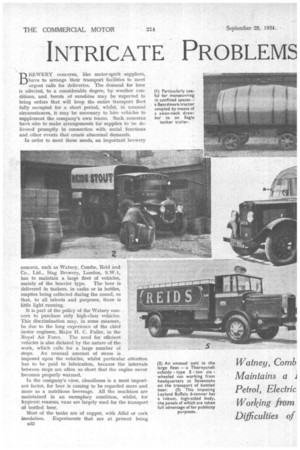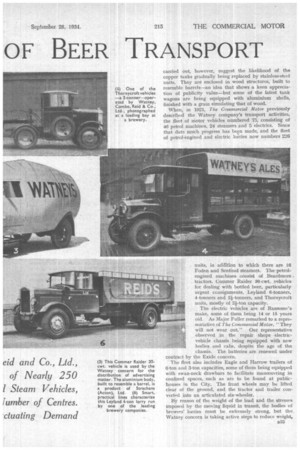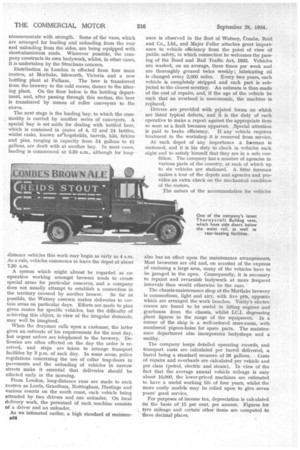INTRICATE PROBLEMS OF BEER TRANSPORT
Page 42

Page 43

Page 44

If you've noticed an error in this article please click here to report it so we can fix it.
BREWERY concerns, like motor-spirit suppliers, have to arrange 'their transport facilities to meet urgent calls for deliveries. The demand for beer is affected, to a considerable degree, by weather conditions, and bursts of sunshine may be expected to bring orders that will keep the entire transport fleet fully occupied for a short period, whilst, in unusual circumstances, it may be necessary to hire vehicles to supplement the company's own teams. Such concerns have also to make arrangements for supplies to be delivered promptly in connection with social functions and other events that create abnormal demands.
In order to meet these needs, an important brewery concern, such as Watney, Combe, Reid and
Ltd., Stag Brewery, London, S.W.I, has to maintain a large fleet of vehicles, mainly of the heavier type. The beer is delivered in tankers, in casks or in bottles, empties being collected during the round, so that, to all intents and purposes, there is little light running.
It is part of the policy of the Watney concern to purchase only high-class vehicles. This discrimination may, in some measure, be due to the long experience of the chief Motor engineer, Major H. C. Fuller, in the Royal Air Force. The need for efficient vehicles is also dictated by the nature of the work, which calls for a large number of stops. An unusual amount of stress is imposed upon the vehicles, whilst particular attention has to be paid to lubrication, because the intervals between stops are often so short that the engine never becomes properly warmed.
In the company's view, cleanliness is a most important factor, for beer is coming to be regarded more and more as a nutritious beverage. All the machines are maintained in an exemplary condition, whilst, for hygienic reasons, vans are largely used for the transport Of bottled beer.
Most of the tanks are of copper, with Alfol or cork insulation. Experiments that are at present being B32
carried out, however, suggest the likelihood of the copper tanks gradually being replaced by stainless-steel units. They are enclosed in wood structures, built to resemble barrels—an idea that shows a keen appreciation of publicity value—but some of the latest tank wagons are being equipped with aluminium shells, finished with a grain simulating that of wood.
When, in 1921, The Commercial Motor previously described the Watney company's transport activities, the fleet of motor vehicles numbered 75, consisting of 46 petrol machines, 24 steamers and 5 electrics. Since that date much progress has been made, and the fleet of petrol-engined and electric lorries now numbers 226
units, in addition to which there are 16 Foden and Sentinel steamers. The• petrolengined machines consist of Beardmore , tractors, Conuner Raider 30-cwt. vehicles for dealing with bottled beer, particularly urgent consignments, Leyland 6-tonners, 4--tormers and 21-tonners, and Thornycroft units, mostly of 2i-ton capacity.
, The electric vehicles are of Ransonie's make, some of them being 14 or 15 years old. As Major Fuller remarked to a representative of The Commercial Motor, "They will not wear out." Our representative observed in the repair shops electricvehicle chassis being equipped with new bodies and cabs, despite the age of the chassis. The batteries are renewed under contract by the Exide concern.
The fleet also includes Eagle and Harrow trailers of 6-ton and 3-ton capacities, some of them being equipped with swan-neck drawbars to facilitate manceuvring in confined spaces, such as are to be found at publichouses in the City. The front wheels may be lifted clear of the ground, and the tractor and trailer converted into an articulated six-wheeler.
By reason of the weight of the load and the stresses imposed by the moving liquid in transit, the bodies of brewers' lorries must be extremely strong, but the Watney concern is taking active steps to reduce weight,
commensurate with strength. Sortie of the vans, which are arranged for loading and unloading from the rear and unloading from the sides, are being equipped with sheet-aluminium roofs. Wherever possible, the company constructs its own bodywork, whilst, in other cases, it is undertaken by the Strachans concern.
Distribution in London is effected from four main Centres, at Mortlake, Isleworth, Victoria and a new bottling plant at Fulham. The beer is transferred from the brewery to the cold rooms, thence to the filtering plant. On the floor below is the bottling department, and, after passing through this section, the beer is transferred by means of roller conveyers to the stores.
The next stage is the loading bay, to which the commodity is carried by another series of conveyers. A special bay is set aside for dealing with bottled beer, which is contained in crates of 4, 12 and 24 bottles, whilst casks, known asihOgshe—ads, barrels, klls, firkins and pins, ranging in capacity from 54 gallons to 4} gallons, are dealt with at another bay. In most cases, loading is commenced at 13.30 a.m., although for long
distance vehicles this work may begin as early as 4 a.m. As a rule, vehicles commence to leave the depot at about 7.30 am.
A system which might almost be regarded as cooperative working amongst brewers tends to create special areas for particular concerns, and a company does not usually attempt to establish a connection in the territory covered by another brewer. So far as possible, the Watney concern makes deliveries to certain areas on particular days. Efforts are made to plan given routes for specific vehicles, but the difficulty of achieving this object, in view of the irregular demands, may well be imagined.
• When the drayrnan calls upon a customer, the latter gives an-estimate of his requirements for the next day, but urgent orders are telephoned to the brewery. Deliveries are often effected on the day the order is received, and steps are taken to arrange transport facilities by 3 p.m. of each day. In some areas, police regulations concerning the use of cellar trap-doors in pavements and the unloading of vehicles in narrow streets make it essential that deliveries should be effected early in the morning.
From London, long-distance runs are made to such centres as Leeds, Grantham, Nottingham, Hastings and various resorts on the south coast, each vehicle being attended by two drivers and one unloader. On local delivery work, the personnel of each machine consists of a driver and an unloader.
As we intimated earlier, a high standard of maintens34
ance is observed in the fleet of Watney, Combe, Reid and Co., Ltd., and Major Fuller attaches great importance to vehicle efficiency from the point of view of public safety, in which connection he welcomes the passing of the Road and Rail Traffic Act, 1E+33. Vehicles are washed, on an average, three times per week and are thoroughly greased twice weekly ; lubricating oil is changed every 2,000 miles. Every two years, each vehicle is completely stripped and each part is subjected to the closest scrutiny. An estimate is then made of the cost of repairs, and, if the age of the vehicle be such that an overhaul is uneconomic, the machine is replaced.
Drivers are provided with printed forms on which are listed typical defects, and it is the duty of each operative to make a report against the appropriate item so soon as a fault becomes apparent. .Special attention
is paid to brake efficiency. If any vehicle requires treatment in the workshop it is removed from service. At each depot of any importance a foreman is stationed, and it is his duty to check in vehicles each night and to satisfy himself that they are in a safe condition. The company has a number of agencies in various parts of the country, at each of which up to six vehicles are stationed. A fitter foreman makes a tour of the depots and agencies and provides an extra check on the mechanical condition of the motors.
The nature of the accommodation for vehicles also has an effect upon the maintenance arrangements. Most breweries are old and, on account of the expense of enclosing a large area, many of the vehicles have to be garaged in the open. Consequently, it is necessary to repaint and revarnish bodywork at more frequent intervals than would otherwise be the case.
The chassis-maintenance shop at the Mortlake brewery is commodious, light and airy, with five pits, opposite which are arranged the work benches. Verity's electric cranes are found to be useful in lifting engines and gearboxes from the chassis, whilst I.C.I. degreasing plant figures in the range of the equipment. In a corner of the shop is a well-ordered store-room, with numbered pigeon-holes for spare parts. The maintenance department also incorporates bodyshops and a smithy.
The company keeps detailed operating records, and transport costs are calculated per barrel delivered, a barrel being a standard measure of 36 gallons. Costs of repairs and overhauls are calculated per vehicle and per class (petrol, electric and steam). In view of the fact that the average annual vehicle mileage is only about 10,000, the lower-priced machines are estimated to have a useful working life of four years, whilst the more costly models may be relied upon to give seven years' good service.
For purposes of income tax, depreciation is calculated an the basis of 15 per cent, per annum. Figures for tyre mileage and certain other items are computed to three decimal places.




















































































